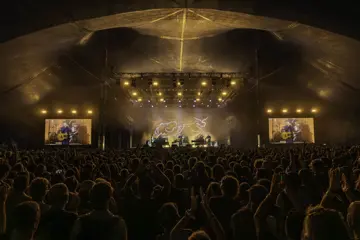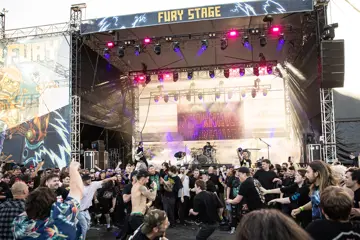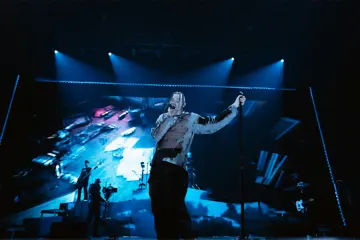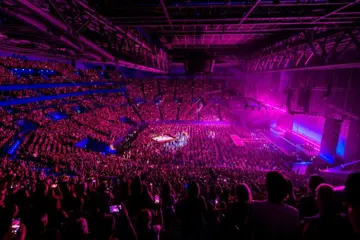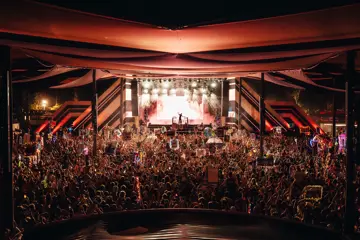Nearly 41 years since it first premiered on television, the classic British sitcom Fawlty Towers makes its official theatrical debut. Adapted for the stage by original writer and actor of the iconic character Basil Fawlty, John Cleese, its world premiere is in Australia. For a TV program that is known and loved worldwide, one would have assumed a premiere on say theatre's hallowed ground of New York's Broadway or London's West End.
"Well I'm a bit nervous about starting anything in the West End because the British newspapers really hate me. And I don't think I would get very good reviews," Cleese explains of why the show is debuting in Australia. "In my autobiography, the reviews around the rest of the world, whether it was Germany or Denmark or South Africa or New Zealand — all very, very good. And English reviews, not very. A couple of good ones, like The Times. But they do not like me because I criticise them. And Broadway is such huge sums of money. It's prohibitively expensive. You go there if you've got a cast iron success, but I don't think it's smart to try and open the play there. So when Phil said Australia I thought, oh yeah, because I really like this place. And as they say, what's there not to like?"
The Phil that Cleese mentions is Phil McIntyre, Cleese's agent. McIntyre is married to CJay Ranger, who is directing the stage version of Fawlty Towers. "She's very good at the technical side that I don't know about. She understands about sets and lighting and I only really understand the acting," Cleese says.
"We didn't write any dialogue for about two and a half weeks. And the result was that the plots are very, very integrated."
But bringing Fawlty Towers to the stage is no easy task. For one, when the episodes were originally written, Cleese and co-writer Connie Booth would spend a lot of time on each script, way more than any other sitcom. Cleese says each episode would take six weeks to write, compared to ten days or less on other half hour shows. "The plots are very, very hard to cut. I mean they were complex plots," Cleese states. "We worked the plots out very carefully. We didn't write any dialogue for about two and a half weeks. And the result was that the plots are very, very integrated. You can't just take a bit out because then there's a bit missing. You can't do it. They tried to do it in America to cut it down to a commercial half hour (for an American TV adaptation of Fawlty Towers) and they said it can't be done."
Don't miss a beat with our FREE daily newsletter
In the end, it was decided that the core of the stage adaptation would be three episodes of the TV show, which ended up being Communication Problems (where the staff deal with a guest that is hard of hearing), The Germans (where a group of Germans are staying at the hotel and Basil can't help insulting them) and The Hotel Inspectors (where Basil gets wind of hotel inspectors in the area and tries to appease them). And rather than play out separately, Cleese says they will be "bringing all the endings together as one huge finale".
"I have to say, one of the nice things about working around it is to realise how funny it is," Cleese mentions of revisiting the show to adapt it for the stage. "Because I don't sit around watching my old programs. I forget the dialogue. When you come to it for the first time it's really funny."

Photo by James Morgan
Even today, the show still holds and is funny four decades after being written. "It doesn't date," Cleese asserts. "There's almost no topical jokes, except [Basil] moans about the trade unions, which is what people did in the '70s. Then Margaret Thatcher came in in '79 and more or less broke their power and the whole thing changed. Instead of hearing about the trade unions on the news every day, you never hear about them anymore."
Not only is the material timeless — namely because it's farce, which translates through the ages - the characters are also classic. Set in the English seaside town of Torquay, the show was about hapless hotel proprietor Basil Fawlty, who ran the establishment with his wife Sybil. The staff included street smart chambermaid Polly and eager to learn but not very competent Spanish waiter Manuel.
"I forget the dialogue. When you come to it for the first time it's really funny."
Despite such iconic characters in the TV show, Cleese wasn't looking for carbon copies when casting the theatrical version. "No, very much not. People are curious about that but I do point out to them in a sort of semi-humorous way that Hamlet has been played by a rather large number of actors and everyone does it differently," he says. With particular reference to the character of Basil Fawlty, "There will be some echo of my performance, and there will be the intrinsic character on the paper and then he will bring something and it will be different. And it's very strange how different people make parts work in different ways if they're good."
Playing the four principal characters in the theatrical version will be Stephen Hall (Basil), Blazey Best (Sybil), Aimee Horne (Polly) and Syd Brisbane (Manuel). And Cleese won't be sad to see someone else play his character. "No, that would never occur to me," Cleese begins. "The only thing I wanted is that it's important to me that it's as good as possible. Because I asked one friend at one point if he wanted to direct and he said it just feels too much like a rip off. And I said well, I don't want it to be a rip off. I want it to be really good on its own terms."
As for how the audience will react, Cleese points out that the main problem will be that "in an audience in the theatre, you have to keep waiting for the laughs". "One of the lovely things about [the TV show] Fawlty Towers was the microphone was there [indicates right above his head]. So if the audience were laughing, you didn't have to wait, you could continue with the dialogue, which keeps the pace up. When you stop, because the audience is laughing, or you say the line they won't hear it — when you do that you slow it down. So the problem is pacing it right in the theatre, because you've got to listen so carefully to the audience. But that's something that actors learn to do."
However waiting for the audience is not something you have to worry about with visual gags, which featured in Fawlty Towers prominently, as there is no line for the audience to hear. "So you can build visual gags and I'm sure that will happen as the guys play it. But it will probably be 20 percent funnier after 50 performances because people learn how to make things work. And you have to learn that in front of an audience, particularly physical comedy," Cleese outlines. "If you have a funny line, you just have to time it right. But if it's a bit of physical comedy, you can sometimes find ways of expanding it and tweaking it and you can make something that should last 15 seconds last 30 seconds."




